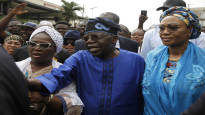The opposition demanded the annulment of the election due to fraud even before the end of the counting of votes. Voter turnout remained at 29 percent, the lowest in Nigeria’s history.
The candidate of the ruling APC party in Nigeria, the most populous country in Africa Bola Tinubu has won the presidential election, the country’s Electoral Commission (INEC) declared on Wednesday.
Tinubu is said to have got 8.8 million votes. The runner-up is the PDP party Atiku Abuakarb collected 6.9 million votes and the Labor Party Peter Obi 6.1 million.
The election turned out to be a surprisingly tight race, as the Labor Party’s Obi attracted the votes of young people in particular when he challenged the country’s established political elite. Of Nigeria’s nearly 90 million eligible voters, nearly 10 million were young people who got the right to vote for the first time.
Tinubu, 70, who is emerging as the head of Africa’s largest national economy, is a long-time politician who served as governor of Lagos from 1999-2007.
The opposition demanded the annulment of the election result
Nigeria’s main opposition parties demanded the annulment of the presidential election held over the weekend due to electoral fraud as early as Tuesday, even though the counting of votes had not yet been completed.
The voting itself has been said to have gone on in the country mostly without problems, albeit slowly. The delays raised suspicions of fraud, but the Electoral Commission rejected the accusations.
– Contrary to what the parties are implying, the results from the states indicate a free, fair and credible process, INEC responded in a statement urging the parties to take their grievances to court.
Opposition parties pointed accusing fingers at the new biometric identification technology and suspected that the results could be tampered with.
– The elections are irrevocably corrupted. We demand the immediate cancellation of these fraudulent elections, said the leader of the Labor Party Julius Abure.
Voter turnout remained at 29 percent, which is six percentage points less than in the previous election four years ago. Of Nigeria’s 87 million eligible voters, only 25 million bothered to go to the ballot box.
In some cases, votes were not cast due to malfunctioning voting machines.
The ruling party APC considers the opposition parties to be bad losers and accuses them of trying to undermine democracy.
Among other things, international election observers sent by the EU have said that the Nigerian elections suffered from logistical problems, a lack of transparency, and that many who wanted to vote were unable to cast their votes.
Simon Ekpa’s tough speeches shook Finland
In Finland, during the elections, a Nigerian born living in Lahti attracted attention Simon Ekpa, which incited the population of southeastern Nigeria to boycott the Nigerian elections.
Ekpa leads a separatist group operating in Nigeria from Finland, which aims to form an independent state of Biafra in the southeastern part of the country. He has said he accepts violence against Nigerian government forces in self-defense.
Despite the threat of violence, the Nigerian elections were largely peaceful.
Read also:
The Twitter Revolution of Nigerian Youths
in Nigeria: Millions stay at home every Monday when Simon Ekpa from Lahti orders – fear is palpable in the region
The police suspect Simon Ekpa from Lahti of a money-raising crime – KRP is also investigating the activities of the Nigerian rebel on social media
